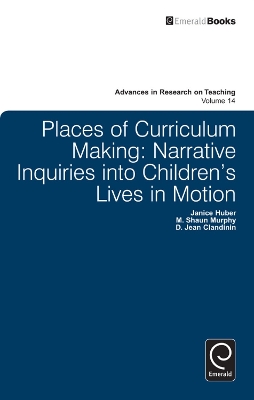Advances in Research on Teaching
2 primary works
Book 14
Places of Curriculum Making
by D. Jean Clandinin, Janice Huber, and M. Shaun Murphy
Published 1 January 2011
This book documents a radical shift in thinking from focusing on the school as the place where curriculum is made to realizing the ways children and families are engaged as curriculum makers in homes, in communities, and in the spaces in-between, outside of school. The narrative inquiry framing this book investigates the tensions experienced by teachers, children and families as they make curriculum attentive to lives. It draws on a research project involving multiperspectival narrative inquiries spanning four research sites and traces the tensions experienced by children, families and teachers in multiple curriculum making sites and some of the profound identity making and assessment making implications that become visible. Its attention to the relational in narrative inquiry is focused on tensions that shape lives and, as well, the unfolding of narrative inquiries. This informative book has a wide reaching audience of educational researchers, teacher educators, research methodologists, particularly those interested in narrative inquiry, curriculum scholars, graduate students, university faculty, teachers, administrators and parents alike.
Book 23
"The book volume shares six narrative accounts, which offer glimpses into the teachers' lives, which are composed with attention to place, temporality, and personal and social dimensions. By inquiring narratively into the experiences of these teachers, the book identifies the complex ways in which the teachers' personal practical knowledge is shaped by their personal knowledge landscapes as well as professional knowledge landscapes. Questions are raised about the implications of seeing teacher attrition as a process rather than singular event, that is, as a process of coming to tell a story to leave by, for our understandings of teacher knowledge and identity. As we shift from seeing "beginning teachers" to seeing "teachers as beginning", that is, as seeing teachers as people with experiences of personal and professional becoming, we shift from seeing them as more than content knowledge and pedagogic skills, but as people in the midst of living lives. This narrative and more holistic understanding of teacher knowledge and identity will help preservice teacher education programs, schools and school districts to better sustain people as they begin to teach and become teachers"

